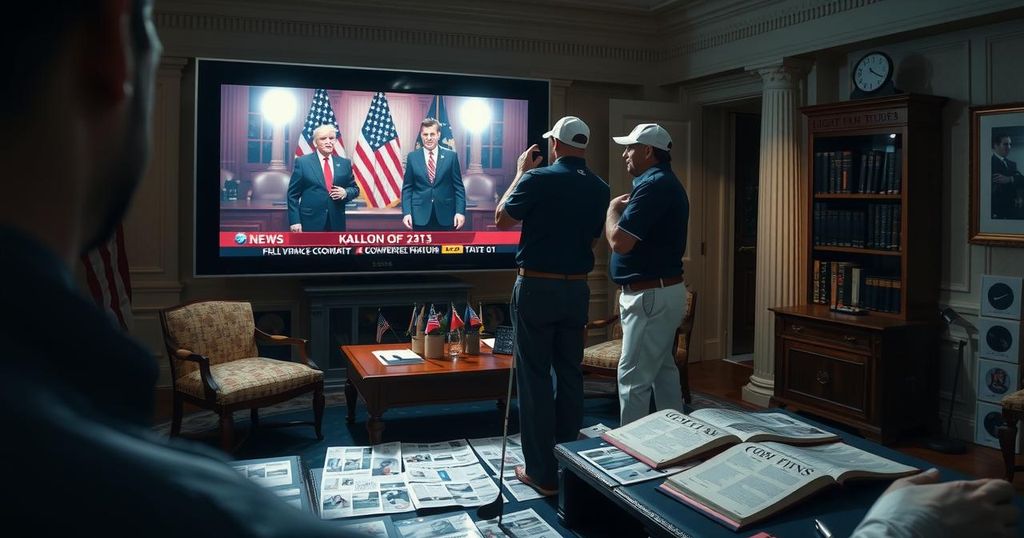Confrontational Diplomacy: Trump and Ramaphosa’s Oval Office Encounter
During a recent meeting, President Trump confronted South African President Cyril Ramaphosa with contentious claims about the persecution of white farmers. The episode featured dimmed lights, a video presentation, and political provocations clearly aimed more at domestic audiences. Despite Trump’s assertions, Ramaphosa maintained composure and used a unique strategy to navigate the tense atmosphere, which is indicative of a larger pattern in Trump’s diplomatic approach.
In Donald Trump’s recent Oval Office meeting with South African President Cyril Ramaphosa, the atmosphere quickly turned confrontational, epitomizing a distinct approach to diplomacy that has characterized his administration. The meeting, which took place merely three months into Trump’s second term, highlighted the risks that foreign leaders may face when seeking an audience with the US President. This particular encounter included dimmed lights, a video presentation, and a barrage of contentious claims.
After an initial, relatively calm discourse, the situation escalated when a journalist prodded Trump regarding the discredited notion of ‘white genocide’ in South Africa. Ramaphosa urged Trump to consider the perspectives of South Africans themselves on the matter. In an unexpected turn, Trump instructed his aides to lower the lights and bring up a video, seemingly prepared for a counter-offensive.
As the lights dimmed, Trump launched into a detailed allegation of persecution against white South Africans, reminiscent of his harsh treatment of Ukraine’s President, Volodymyr Zelensky, just months before. The video displayed political figures vehemently chanting anti-apartheid sentiments. Despite the inflammatory footage, Trump’s claims regarding the political leaders’ ability to confiscate land from white farmers were factually misplaced, as these individuals are not in power.
While it is true that Ramaphosa has signed a controversial measure allowing land expropriation without compensation, its enactment is pending. He took care to distance himself from the incendiary rhetoric depicted in the video Trump presented. To navigate this contentious conversation, Ramaphosa strategically brought in renowned South African golfers, Ernie Els and Retief Goosen, attempting to soften the diplomatic blow with a touch of shared cultural relevance.
During the meeting, Trump appeared visibly pleased with the presence of the golfers. This unusual tactic—addressing trade policies alongside sports figures—would likely not feature in any formal diplomatic guidebook. Nevertheless, the golfers occupied a significant portion of the discussion, while Ramaphosa remained largely restrained in his responses, likely content to play a supportive role in a complex interaction.
Moreover, even as Trump reiterated concerns for the plight of white farmers and mentioned the possibility of refugee resettlement in the US, Ramaphosa refrained from engaging deeply with Trump’s provocations. At one juncture, he quipped about the presence of his delegation, stating, “If there was Afrikaner farmer genocide, I can bet you, these three gentlemen would not be here.” While Ramaphosa did not react strongly to Trump’s assertions, it is worth noting that the intent behind such confrontational diplomacy is as much aimed at appeasing domestic audiences as it is about international relations.
Overall, Trump’s theatrical diplomacy serves to fuel the grievances surrounding his administration’s core supporters. As international leaders grow more adept at handling such encounters, it may force Trump to adapt his style to maintain relevance and impact in future dealings with foreign dignitaries.
In summary, the recent Oval Office meeting between President Trump and South African President Ramaphosa showcased a typical example of Trump’s provocative diplomatic style. Despite facing challenges and assertions from Trump about the plight of white South Africans, Ramaphosa maintained a diplomatic stance. The use of cultural figures like golfers sought to soften the discussion, highlighting a multifaceted approach to international relations. However, the performative nature of these encounters speaks more profoundly to Trump’s domestic audience, reflecting ongoing grievances that play a central role in his political narrative.
Original Source: www.bbc.com




Post Comment